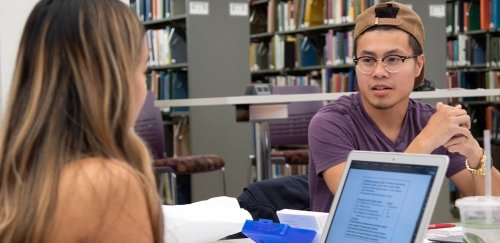Program Information
What is FYS?
First Year Seminar is part of Rhode Island College's General Education Program, and is a required class for all first year students at the College.
What makes First Year Seminars special?
First Year Seminars provide you with a great opportunity to explore a fascinating subject with a full-time faculty member and a small group of your classmates. The class size (no more than twenty students) and intensity of the work fosters lasting connections with faculty and other students. Plus, you get to hone academic skills crucial to success at college and beyond.
What can I expect to do in my First Year Seminar?
- Explore the academic world. Read the most recent scholarship on a topic. Join others in addressing topics from disciplines across the College.
- Connect with scholars. Work closely with other first year students and a full-time Rhode Island College professor. Make connections that can last a lifetime.
- Expand horizons. Pose questions, identify solutions, and communicate your newfound knowledge to others.
Are there specific academic skills that I can expect to polish in this class?
In your First Year Seminar, you will sharpen skills that will be crucial in your studies at the College, and in your life beyond: critical and creative thinking, effective oral and written communication, group collaboration, and the ability to research efficiently and ethically.
The FYS topic I’m interested in seems pretty advanced. Are you sure that that I am qualified to take the class?
Each First Year Seminar is designed for students with no previous knowledge in the field. So, for example, if you are interested in a physics based class, but have no background in physics, have no fear. The class will be designed to provide whatever introduction is necessary for in-depth discussion.
When do I have to take FYS?
All First Year Students (those entering the College with 23 or fewer credits transferred from another college) must complete a First Year Seminar in one of their first two semesters on the campus.
What if I am a second or third year RIC student? May I still enroll in a First Year Seminar?
Unfortunately, First Year Seminars are only open to first year students. If you are interested in a particular topic, please feel free to contact the professor to see if she or he will be looking at similar material in other classes.
Who do I contact if I have any other questions?
Please direct any questions to the First Year Seminar Coordinator, Dr. Leslie Schuster.
Where can I get academic help?
- Counseling Center
Browne Hall
401-456-8094 - Learning For Life (L4L)
Adams Library, Level 1
401-456-6320 - Mathematics Learning Center
Adams Library, Level 1
401-456-9763 - Academic Advising
Adams Library, Level 1
401-456-8083 - Study Skills and Test Taking: The Academic Development Center
401-456-8083
Do you have other questions or concerns?
Please direct any questions to the First-Year Seminar Coordinator, Dr. Leslie Schuster.
About FYS
This innovative and important program is designed to introduce first year students to both the challenges of academic engagement and the pleasures of belonging to the RIC community of scholars. We hope that students will remember their First Year Seminar course as one of the most important classes in their college careers.
FYS 100 is an opportunity for faculty members to pursue a personal interest or passion that may or may not be directly connected to their usual areas of academic expertise or pedagogy. Professors are encouraged to think creatively to construct projects and experiences so that students will not merely be the recipients of knowledge, but will be actively engaged in the learning process. Because the course is open only to first or second semester students, the instruction should be targeted at that level, and cannot assume prerequisite skills or knowledge.
First Year Seminars Should
- engage students in academic conversation
- offer students opportunities to work collaboratively with others
- guide students in constructing academic questions
- introduce students to college-level academic writing and speaking
- help students begin to learn how to evaluate all information critically, including its sources and authority; to recognize quality of material or point of view; and to respond to quality of material and/or point of view
- provide incoming students with academic role models
- establish standards of academic behavior and college expectations
- teach skills and introduce Rhode Island College resources organically throughout the class as they become relevant
- Provide support for the transition from high school to college
- Encourage connections among the students, with faculty, with the College, and with the broader community
FYS Should Not
- be dominated almost entirely by lecture
- be online or hybrid courses. (Blackboard, however, may certainly be used as a tool for student engagement)
- be introductions to a discipline or a survey of a field
- use exams, whether mid-term or final
- require "term papers" or other lengthy, research-based essays
Teaching First-Year Students
While developing the course, professors should remind themselves that these students are inexperienced with the academic world, but that they are very excited about being a part of it and are willing to work hard to succeed. Some may see the College as a place for a fresh start, where they can develop skills with which they may have struggled in high school. FYS is designed to channel that excitement into an active and informed participation in academic discourse. At the end of the First Year Seminar, students should feel a sense of pride and accomplishment for tackling a rigorous class successfully.
Course Format and Assignments
Creative assignments, including field experiences and assignments that make imaginative use of technology or ask students to engage in service, are welcomed. Professors should be aware of their own pedagogical strengths, and centralize those strengths for this class. Each FYS course should be designed to introduce students to the General Education Outcomes listed below, with assignments and activities designed to help students begin to master these outcomes. Help and advice are available both from the First Year Seminar Coordinator and from the Faculty Center for Teaching and Learning (FCTL).
General Education Outcomes Associated with FYS:
All the outcomes should be considered at the introductory level. So, for example, for the research and information literacy outcome, FYS is following the example of First Year Writing and focusing on helping students to understand that research is an iterative process. In FYS, students should begin to learn how to evaluate all information critically, including its sources and authority; to recognize quality of material and/or point of view; and to respond to quality of material and/or point of view.
- collaborative work
- critical and creative thinking
- oral communication
- research and information literacy
- written communication
- Committee on General Education
- Faculty Center for Teaching and Learning
- The Writing Board
- User Support Services
Please direct any questions to the First-Year Seminar Coordinator, Dr. Leslie Schuster.



